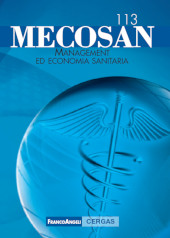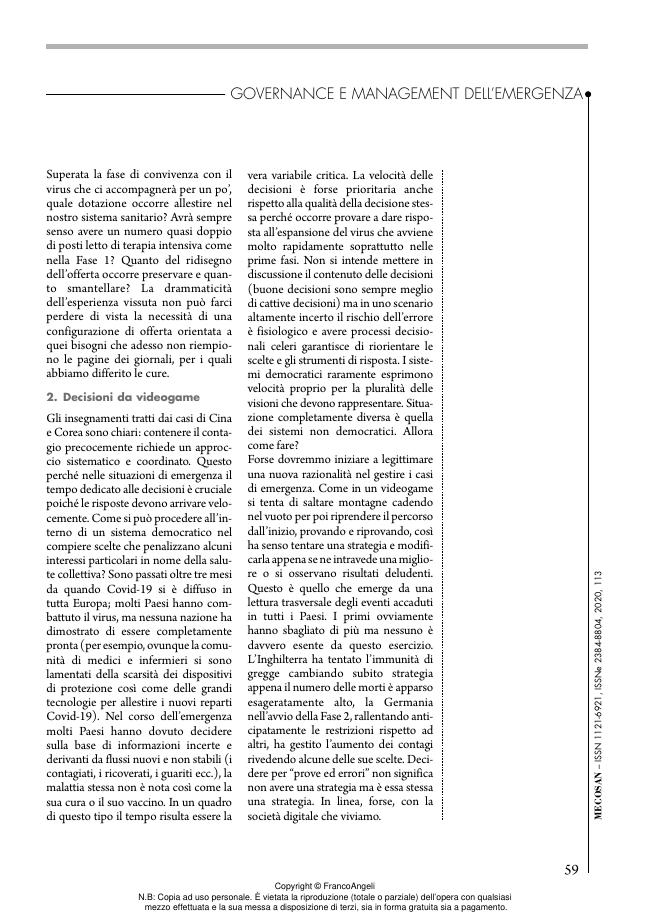Alcune riflessioni prima di tirare le somme
55-62 p.
L'intero pianeta sta attraversando una sfida senza precedenti sotto il profilo sanitario, economico e geopolitico che coinvolge oltre 4 billioni di persone in piu di 100 Paesi a vivere condizioni molto diverse dalla normalita come il distanziamento sociale, la riduzione di tutte le forme di socialita a rischio di contagio e l'isolamento. Sebbene si sia lontani da valutazioni sulle condizioni di successo di questa battaglia, in molti casi si osservano riflessioni forse frettolose sui sistemi sanitari che in tempi e condizioni differenti hanno affrontato la fase piu complessa della pandemia e sono ancora alle prese con essa. I suggerimenti proposti nel contributo hanno lo scopo di rappresentare alcune cautele (o di proporre almeno dei distinguo) nella valutazione dei sistemi. Per primo, e opportuno distinguere quanto e accaduto nel momento dell'emergenza da quanto succedeva prima. Usare la crisi per costruire giudizi sugli interi sistemi potrebbe essere non corretto e pericoloso.
Meglio usare le lezioni apprese grazie a essa per riprogettare le aree di debolezza mostrate da chiunque. In secondo luogo, la pandemia ha costretto i sistemi a decidere sulla base di informazioni non certe e ambigue e (come nel caso dell'Italia) in assenza di esperienze pregresse paragonabili. In condizioni di grande incertezza forse e meglio decidere in tempi celeri, assumendosi il rischio dell'errore, che avere processi decisionali e strategie di lungo termine. Il tema della velocita sfida i sistemi pubblici e quelli democratici e in situazioni di normalita garantisce pero la "seconda chance" (razionalita da videogame). La terza cautela riguarda la centralita dei sistemi sanitari e del tema "salute" in generale per la vita delle persone e dell'economia e, mai come in questo momento, abbiamo scoperto quanto il SSN rappresenti una risorsa (e non solo un costo) per le comunita. [Testo dell'editore].
The current crisis is an unprecedented global challenge in terms of its health, economic, social, and geopolitical impact. More than 4 billion people in over 100 countries are living in some sort of lockdown. Each country has chosen its own strategy, adopting a variety of measures in an attempt to fight an unparalleled menace. Although it will take time to draw conclusions on what are the key factors for success in this battle, several preliminary lessons can be learned from those coun tries that were forced to face the emergency before others. But before assessing, some distinctions should be made First: the pandemic is an episodic phenomenon that shocked regional health systems in Italy. Don't mistake emergency for normality (the synecdoche risk): regions most affected by the SARS-CoV-2 have a really good quality health care services but unfortunatly helpless to respond in an age of pandemic.
Getting it wrong might be the way for learning from mistakes (not for destroying what can still be useful). Second, decisions in a great uncertainty scenario should be changed quickly as in a video game (videogame rationality). Third, our SSN is a resource not only a cost. By acknowledging the central importance of the healthcare system in society, the cost-containment policies of the last few decades that have been waged on healthcare systems around the world need to be reconsidered. By acknowledging the central importance of the healthcare system in society, the cost-containment policies of the last few decades that have been waged on healthcare systems around the world need to be reconsidered. Warnings of the risks of such policies have been neglected for too long. The current epidemic has demonstrated that debilitated healthcare systems can be brought to the brink of collapse with unforeseen consequences for the entire society. [Publisher's text].
Forma parte de
Mecosan : management ed economia sanitaria : 113, 1, 2020-
Artículos del mismo número (disponibles individualmente)
-
Información
Código DOI: 10.3280/MESA2020-113008
ISSN: 2384-8804
MATERIAS
KEYWORDS
- Covid-19, pandemia, crisis management, valutazione sistemi sanitari, decision making
- Covid-19, health pandemics, crisis management, government and politics, decision making



